An Ode To Jillian Dempsey
Trying to pay homage to a legend's career in an ever-changing landscape of professional women's hockey
I. The Past
The last league to truly challenge the NHL as the best major hockey league in the world was the World Hockey Association, a league that existed between 1972 and 1979 and is best known for challenging the reserve clause of the NHL and signing quite a few star players to the biggest contracts hockey had seen up until that point. The five chaotic years that the WHA existed would be characterized by instability, teams constantly moving and folding, sloped ice surfaces, and star players being barred from playing for Team Canada. Despite its plentiful problems, it was also a league that changed professional hockey as we know it with its salary expectations and contract terms. The WHA took some of the first major steps in recruiting European talent to play in North America, and star players ranging from Mark Messier to Gordie Howe to Wayne Gretzky took the ice for its teams. The WHA was also a league that hosted two to four million spectators a year, many of whom were dedicated fans who still document and preserve what they can of a league that hasn’t played a game in fifty years. If you want a taste of what it would have been like to be a fan of the WHA, enjoy this video of a game between the Winnipeg Jets and the New England Whalers.
When people think of the WHA, they may think of the aforementioned NHL Hall of Famers who spent several seasons of their career in the league, but no one deserves to be the face of the WHA more than André Lacroix. Lacroix spent several years in the NHL as well, but his peak years were in the WHA, a league he played in every year of its existence, ending up the all-time points and games played leader. He was the two-time winner of the Red Tilson Trophy for league MVP, won Rookie of the Year, and had six seasons with over 100 points. At the top of every WHA record book, Lacroix is there, sitting untouchable because there are no more WHA games to be played and no more WHA goals to be scored.
The kind of unbreakable record that Lacroix has comes with an unbearable loneliness. Name eternal, but no rafter to hang his number from, no place to put a statue, no team shop you can walk into and buy his jersey like you can do for a lot of hockey legends. His record exists out of modern context, suspended in a pivotal moment in hockey history, and stuck.
After Jillian Dempsey announced her retirement, I’ve been thinking about André Lacroix.
II. The Present
Jillian Dempsey watches her former youth team during Boston Pride’s intermission
Jillian Dempsey is a player you can’t describe without mentioning Boston first and foremost. During her tenure, she contributed to four championships (one by the Blades, three by the Pride) for a professional team in Boston. Two of them were teams she captained. Logan International Airport in Boston hangs a banner for all championships won by local teams, and the Pride were the first women’s team to be featured there, Dempsey present for every iteration worth honoring. Between the Blades, Pride, and Fleet, she totaled 211 professional points as a member of a Boston professional hockey team, a number that is going to take a long time for anyone to surpass. What no one will ever touch is her 161 total points (146 in the regular season) that made her the Premier Hockey Federation all-time point leader, or her 158 games played.
There is a certain brand of hockey that Dempsey played, which became the distinct calling card of the Boston Pride as a whole during their best seasons: defensively responsible, unselfish, dynamic passing, ability to get open in the toughest of defenses, and extremely disciplined. For fans of men’s hockey who were getting into women’s hockey as the club level became more popular in the United States in the 2010s, it was easy to watch Dempsey and immediately compare her on-ice style of play and demeanor to Bergeron on the Bruins, a familiar narrative that served as a vehicle for new fans to connect. Those who kept watching got to learn more and more about Dempsey as her own person, particularly her off-ice personality that earned her respect from everyone she came in contact with.
Tweet from Marisa Ingemi from March 27, 2021: “Fratkin: “(Jillian Dempsey) is by far the best leader I have ever had as a player.” She tears up a bit talking about her captain. “Every single person in that locker room, when she says something, is listening.”
Tweet from Jenna Rheault after Dempsey received the Hockey Legacy Award: “This girl should be everyone’s idol. She’s an inspiring teacher by day and an absolute work horse on the ice at night. The best part about her is that she’s the most genuine person and such a great leader. I’m so lucky to have you as a friend and as my captain. SO proud of you!”
Even for the biggest hockey nerds, it’s who a player is beyond their skills that makes them so special to watch. Dempsey was someone the Boston fans could identify with. She’s from Winthrop, went to high school and college in Massachusetts, is a teacher as well as a hockey player, and is equally obsessed with Boston sports as her fans are. She always got what it meant for fans, because she was frequently that fan growing up and into her adulthood. You could find Dempsey at just about every charity event her team put on, every clinic, every media scrum, and signing every autograph. Even on the Fleet, when she was a reserve, she made frequent appearances at all their community and fan-facing events. Pride fans saw Dempsey achieve dreams that were unheard of for women’s hockey players at the club level just a decade prior - she was playing hockey games and scoring Isobel Cup Final goals on ESPN and NESN and NBCSN, won awards, was invited to prestigious sport spaces - and yet you could still find her at the local card signing, or at the parent teacher conference for the fifth grade class she taught, or running errands at Market Basket.
Jillian Dempsey volunteering with Boston Fleet teammates Shay Maloney and Loren Gabel
We live in a day and age where athletes can be far removed from the communities they play in. I don’t blame the athletes for this. A lot of it is due to the lack of agency in where they play that sends them to unknown places, the erosion of privacy that comes with increased fame, and the amount of time they have to dedicate to the team itself. Athletes don’t have to be your kid's role model or your neighbor; it’s not inherent to the job title. But Dempsey was, and she wanted to be. Her career felt like a call back to a possibly nonexistent and romanticized time when athletes represented your town, your city, your community.
Jillian Dempsey serves as the banner captain for the Boston Bruins, waiving a flag before a playoff game
III. The Future
André Lacroix’s impact on the game of hockey is undeniable. There are people who, out of their own dedication, have taken the time to archive Lacroix’s interviews. For the people of New Jersey, San Diego, and Houston, Lacroix was the first professional hockey superstar they watched in their city. His name sits at the top of most of the record books for the World Hockey Association, a league that revolutionized labor in hockey with its lack of reserve clause and higher salaries, a league that he helped legitimize with his talents. André Lacroix’s name may not be one that all hockey fans know, but his legacy is one that they’ve certainly felt.
I struggle with how much, even in the digital age, of the contextualization of Dempsey’s accomplishments will be lost to time. PHF games are not available to watch anywhere. Highlights are few and far between, spread across platforms, deleted accounts, and Internet Archive links. When I was a kid, I never understood why my mom would store a select few sacred hockey games on the DVR, but I find myself doing the same now in GIFs and screen recordings.
Jillian Dempsey scores a goal against the Toronto Six
Legacy is a living, breathing thing beyond any monument you could build or any jersey you could buy. Dempsey’s legacy was on display in her initial return to Boston during her one professional season spent away from the city, where fans made their own tribute video to welcome her back, and her former students were in the crowd supporting her. One of her former students is a young girl who also plays hockey and wears the number 14 because of Dempsey. Soon, that young girl and others around her same age who grew up in the Boston area will be old enough to attend college. Maybe she will have a chance to play professional hockey, and Dempsey will be a part of why she chose that path and why she could choose that path. When people evaluate those up-and-coming players and see young centers who are good at face-offs, high-quality passing, excellent fitness, and efficient puck retrieval, Dempsey will be one of the comparables in the scouting reports, an archetype for players to strive to. Inevitably, some fans in the stands will make the same comparisons, and tell the people around them about the Boston Pride team they watched that turned out to be a dynasty. Maybe there is no statue, or plaque, or banner, but the city of Boston and the sport of hockey will have plenty of living examples of Dempsey’s impact.

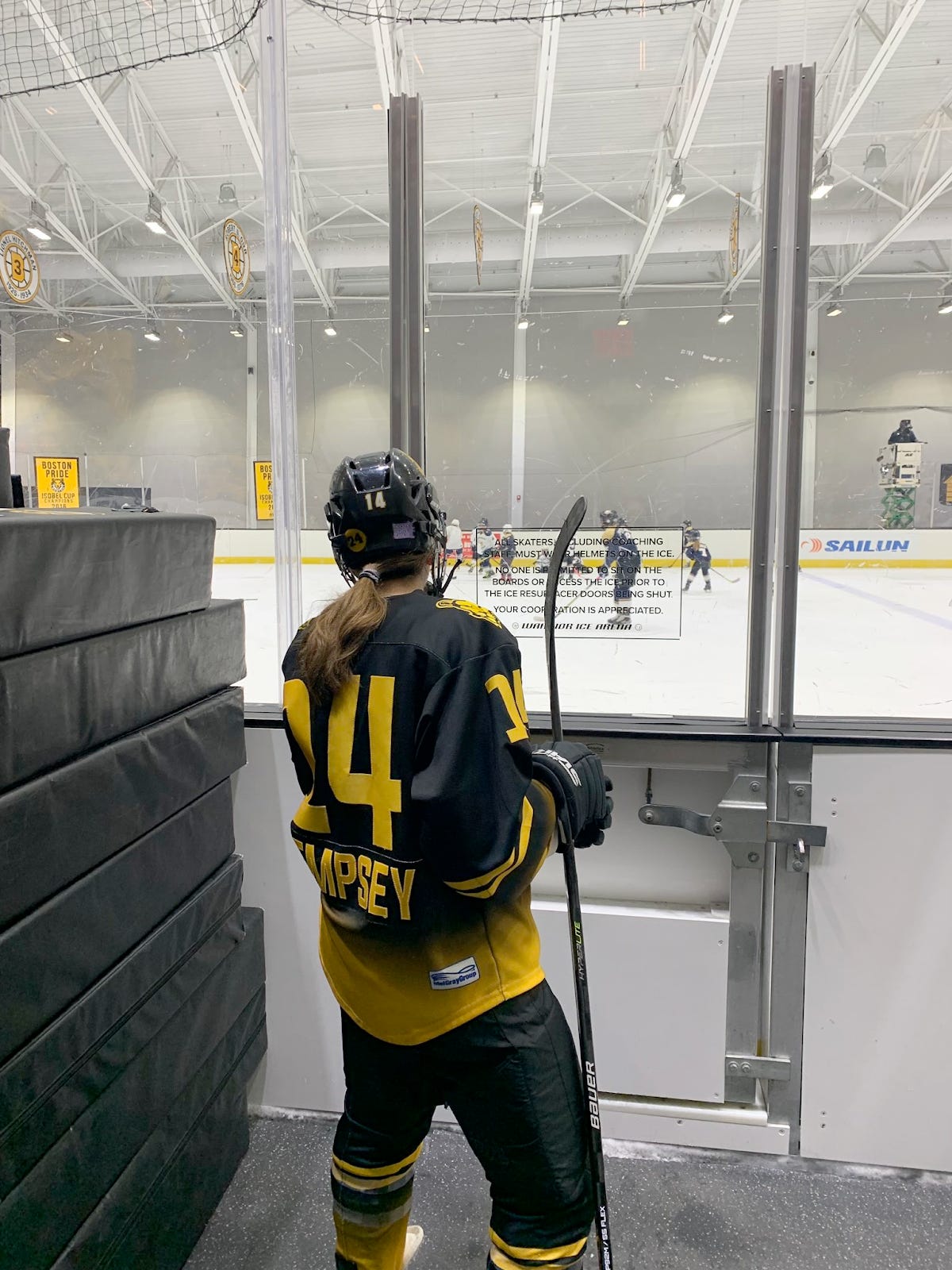
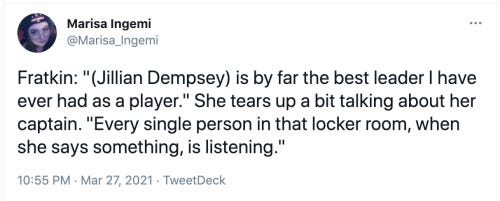
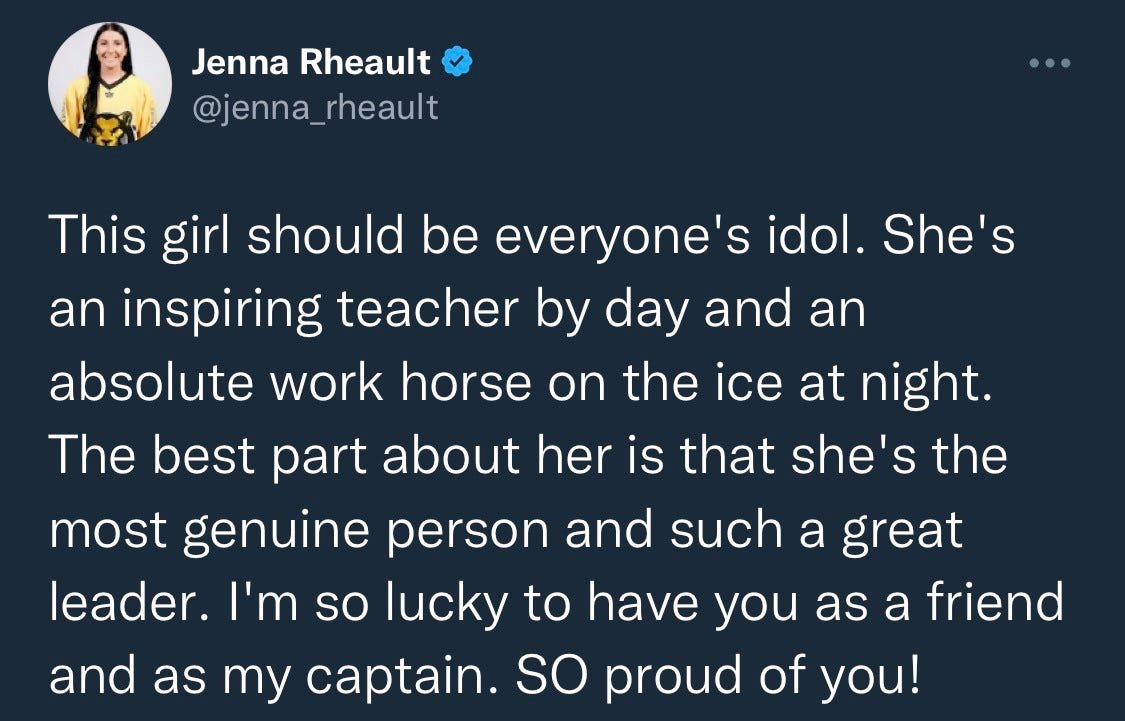

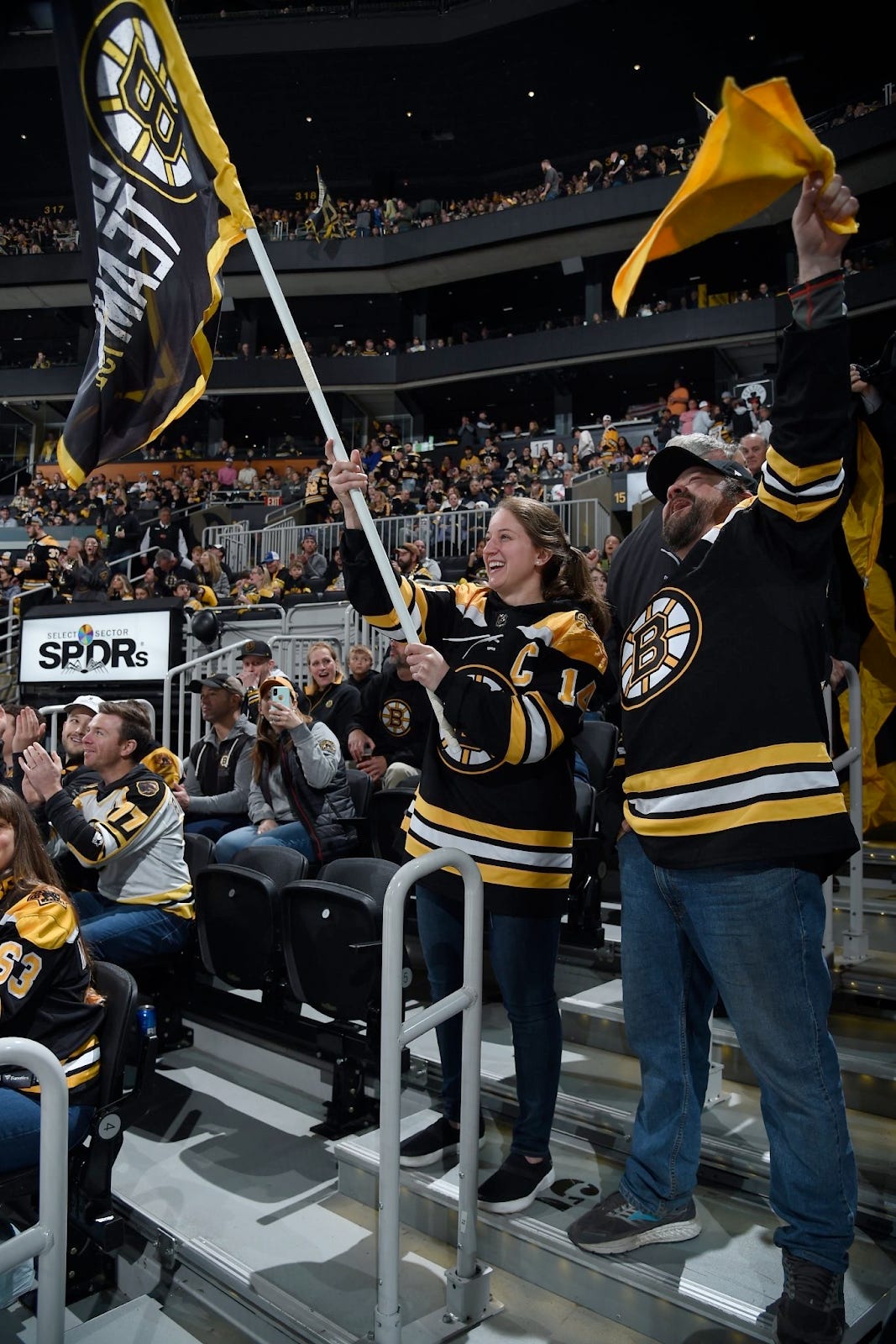

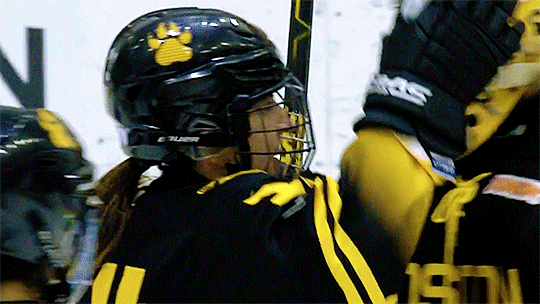
Wonderful ode to an incredible player